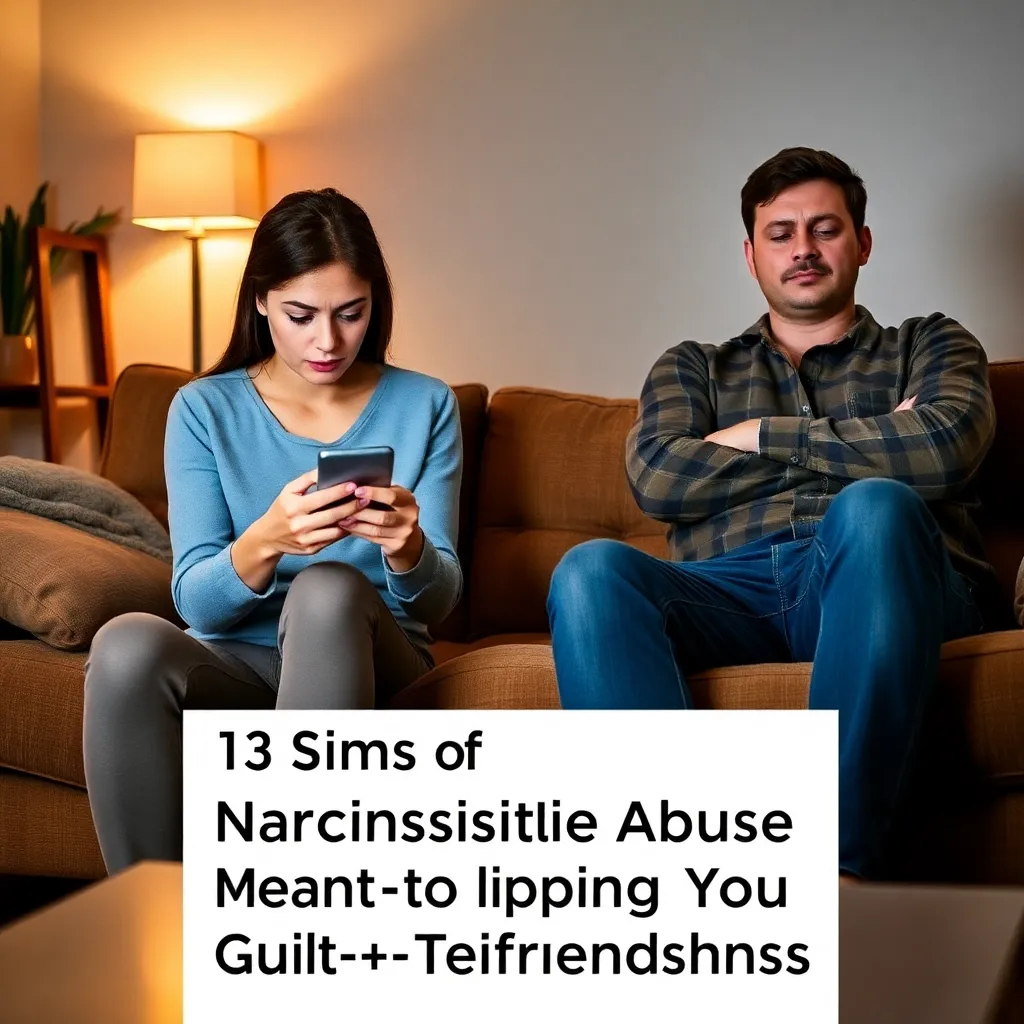Navigating the complexities of a relationship can often feel like walking a tightrope, especially when subtle emotional manipulations begin to unravel your sense of self. If you’ve ever found yourself feeling more isolated and less like “you” while in a relationship, you might be experiencing narcissistic abuse, a deeply confusing and often hidden form of manipulation. Recognizing these signs can be both empowering and liberating, helping you reclaim your sense of autonomy and self-worth.
Understanding the nuances of narcissistic abuse is crucial because it often masquerades as love or concern, leaving you questioning your own perceptions. In this article, we will explore 13 specific signs that are designed to isolate you, giving you the clarity needed to identify and confront these manipulations. Our goal is to provide you with practical insights that not only illuminate the path toward healing but also restore your confidence in your ability to foster healthy relationships.
As you delve into this topic, know that you are not alone in this journey, and it’s okay to seek support and understanding. By learning to spot these signs, you will be better equipped to protect your emotional well-being and build connections that truly enrich rather than diminish your life. This article aims to be a beacon of clarity and encouragement, offering the tools you need to step confidently toward a brighter, more authentic future.
1. Constant Criticism of Friends

In a relationship where narcissistic abuse is present, you might notice a steady stream of criticism directed at your friends. This is a tactic often used to create a sense of doubt about the quality of your friendships, making you question their loyalty or intentions.
Imagine a scenario where every time you mention a close friend, your partner finds something negative to say about them. They might point out supposed personality flaws or suggest that your friend isn’t supportive enough, subtly eroding your trust in that relationship.
Such behavior can be incredibly isolating, as it slowly chips away at your social circle, leaving you more dependent on your partner for emotional support. Over time, you may find yourself feeling more alone than ever before, even when surrounded by people who care about you.
Expert psychologists suggest that this form of manipulation is meant to weaken your social support network, making it easier for the narcissist to control you. By understanding this pattern, you can take steps to protect your friendships and reinforce your emotional independence.
Ultimately, recognizing this behavior is a crucial step towards reclaiming your autonomy and strengthening your connections. Remember, healthy relationships celebrate and support your social life rather than diminish it.
2. Isolation from Family Gatherings

When a partner begins to subtly discourage your attendance at family gatherings, it can lead to feelings of isolation. They may claim these events are a waste of time or criticize your family’s dynamics, making you question your own perceptions.
In many scenarios, you might hear phrases like, “Your family doesn’t really care about us,” or “They never support your decisions.” Such remarks are often designed to create a wedge between you and your loved ones, leaving you feeling unsupported.
Experts note that this form of manipulation is a classic tactic used by narcissists to erode your support network. By isolating you from those who care about you, the narcissist gains more control over your thoughts and actions.
To counteract this, it’s essential to maintain open communication with your family despite the discouragement. Attend gatherings when possible and share your experiences with relatives who can provide a different perspective on your situation.
Remember, genuine family bonds can provide a crucial lifeline when you’re feeling isolated. By staying connected, you empower yourself to recognize the truth of your relationships and maintain your independence.
3. Monitoring Your Social Media

In today’s digital age, monitoring your social media can be a subtle yet powerful tool used to isolate you from your support network. A partner might insist on having access to your accounts under the guise of concern or trust, but this often leads to constant surveillance and control over your interactions.
Your posts, comments, and friend list may become subjects of scrutiny, leading you to feel anxious about your online presence. This level of monitoring can result in self-censorship, where you start avoiding interactions that might trigger jealousy or disapproval from your partner.
Consider the scenario where your partner questions every new friend request you receive, making you feel guilty for expanding your social circle. Over time, this constant questioning can erode your confidence, making you hesitant to engage with others, even in an innocent context.
As relationship expert Dr. Emily Norton suggests, allowing a partner to overly monitor your social media is rarely about protection and more about control. To reclaim your digital space, set clear boundaries regarding your online privacy and communicate that trust should be mutual.
When you take steps to protect your online autonomy, it can significantly strengthen your sense of self and your connections with others. Remember, healthy relationships thrive on mutual respect and trust, not surveillance.
4. Discouraging Independent Activities

When a partner starts to subtly discourage your independent activities, it can be a sign of narcissistic abuse. They might express disinterest or even disdain for the hobbies and friendships that bring you joy, making you feel guilty for spending time away from them.
Imagine planning a night out with friends and your partner suddenly making you feel like it’s a betrayal. This tactic is often used to keep you reliant on them, slowly eroding your social support network and self-confidence.
An expert insight reveals that narcissists may frame their discouragement as concern for your well-being. They might say things like, “I’m just worried about you,” when in reality, it’s a ploy to keep you from pursuing activities that don’t include them.
To counter this, it’s crucial to maintain your personal interests and connections with loved ones.
This not only boosts your emotional resilience but also signals that your life is multifaceted and valuable.
5. Guilt-Tripping Over Friendships

In a relationship where narcissistic abuse is present, you might feel an overwhelming sense of guilt when spending time with friends. A narcissistic partner often employs guilt-tripping as a tactic to make you feel as though your friendships are a betrayal of the relationship. This emotional manipulation can manifest through subtle comments or more direct accusations, leaving you questioning your loyalty.
Imagine planning a simple coffee date with a friend, only to be met with your partner’s disapproving remarks. They might say something like, “I guess I’m just not enough for you,” casting doubt on your decision to nurture outside relationships. This tactic can create an internal conflict, making it easier for them to control and isolate you over time.
Experts in relationship dynamics emphasize the importance of maintaining a supportive social circle. Friends can be a lifeline, offering the perspective and support you might not find at home. An effective strategy is to openly communicate with your friends about your situation, ensuring they understand your need for their companionship.
It’s crucial to recognize that no healthy relationship will require you to choose between your partner and your friends. Instead, a loving partner will encourage you to maintain and cherish these connections. By prioritizing your friendships, you reinforce your own network of support, which can be invaluable in countering isolation tactics.
Ultimately, it’s essential to trust your intuition and prioritize your mental health and well-being. Remember that true connection thrives on mutual respect and support, not guilt and control. By asserting your right to maintain friendships, you set a foundation for healthier interactions and a more balanced life.
6. Undermining Your Self-Worth

In a relationship characterized by narcissistic abuse, your partner may work subtly to undermine your self-worth. They may disguise their criticism as “constructive feedback,” but the intent is often to make you doubt your abilities and value. Imagine a scenario where you achieve a personal milestone, only for your partner to downplay it by pointing out minor flaws. This constant belittling can lead to a cycle of self-doubt, ultimately making you feel dependent on their approval.
Another subtle tactic is when a narcissistic partner uses manipulative comparisons to erode your confidence. They might frequently compare you unfavorably to others, implying that you don’t measure up. Hearing statements like “Why can’t you be more like them?” can be both hurtful and damaging. Over time, these comparisons may make you question your self-worth and capability, leading you to isolate yourself from others who might offer support.
It’s crucial to recognize that these actions are intentional strategies to control and isolate you. By making you feel inferior, a narcissistic partner seeks to ensure you rely solely on them for validation. This creates a dependency that empowers them while stripping you of your independence and self-esteem. Understanding this pattern is the first step in reclaiming your self-worth and setting boundaries.
Building back your confidence starts with acknowledging your intrinsic value and reframing negative self-talk. Focus on your achievements, however small, and celebrate them as steps toward growth. Remember, you deserve to be in a relationship where your worth is recognized and cherished, not diminished. By taking these steps, you can begin to break free from the cycle of narcissistic abuse and reclaim your sense of self.
7. Controlling Financial Decisions

In many relationships, financial decisions symbolize a shared vision, but in a narcissistic dynamic, they often become a tool for control. A partner might insist on being the sole decision-maker for all financial matters, leaving you feeling powerless and dependent. Imagine a scenario where your every purchase is scrutinized, and you’re made to justify even minor expenses. This isn’t about budgeting; it’s about exerting control and limiting your freedom.
Consider the case of a partner who restricts your access to joint bank accounts, using money as leverage in arguments. This behavior can gradually erode your sense of financial independence, making you feel trapped and reliant. Financial expert Dr. Emily Sanders notes that this pattern is a red flag, as it strips away your autonomy and leaves you vulnerable. Recognizing this tactic is crucial, as it helps you take steps to regain control.
Another common tactic is imposing excessive scrutiny over your spending habits, which can feel belittling and invasive. Constantly having your purchases questioned can cause self-doubt and anxiety, leading to a lack of confidence in your financial decisions. To combat this, it’s essential to establish clear boundaries and communicate your financial needs assertively. Remember, your financial independence is a vital part of your overall well-being.
Being aware of these tactics can empower you to take back control of your financial life. Begin by reviewing joint finances regularly and ensuring transparency from both sides. This reduces the chance of one partner using money as a weapon to isolate the other.
Ultimately, protecting your financial autonomy is a step towards reclaiming your personal power.
8. Frequent Emotional Outbursts

In relationships marked by narcissistic abuse, you may experience your partner’s frequent emotional outbursts as a tool to keep you off balance. These outbursts might seem unpredictable and excessive, often leaving you feeling like you have to walk on eggshells to avoid triggering them.
Imagine a scenario where a simple disagreement over dinner plans spirals into a dramatic argument, with your partner’s emotions flaring intensely. Such volatile reactions can be used to foster an environment of fear and uncertainty, ensuring that you remain compliant and hesitant to voice your own needs.
Experts suggest that these emotional eruptions are often a facade to mask deeper insecurities and to manipulate the emotional climate of the relationship. By manufacturing a crisis, the narcissist can shift the focus away from their own faults and onto your reactions, making you question your own behavior rather than theirs.
To manage these outbursts, it’s crucial to remain calm and not engage with the drama. Instead, set clear boundaries about what behavior is acceptable and protect your own emotional well-being.
Recognizing the pattern of using emotional volatility to maintain control can empower you to seek healthier interactions. Your awareness and response can pave the way for establishing stronger, more respectful boundaries.
9. Creating Unnecessary Drama

In the realm of relationships, a narcissist often thrives on creating unnecessary drama to keep their partner off balance. This drama serves as a diversion, drawing attention away from their own shortcomings and toward a fabricated crisis.
For instance, a small disagreement can be blown out of proportion, turning a minor issue into a full-blown argument. During these episodes, the partner may feel like they are walking on eggshells, unsure of what might set off the next explosion.
Experts suggest that this tactic is designed to exert control and keep the partner feeling dependent and isolated. By constantly stirring up chaos, the narcissist ensures that their partner remains focused on appeasing them rather than maintaining external relationships.
To navigate this storm, it’s crucial to recognize the pattern and not get swept up in the emotional turbulence.
Concluding every episode of unnecessary drama with self-reflection and open communication can help regain a sense of control. By doing so, you can slowly dismantle the dramatic facade and begin to rebuild your sense of autonomy and peace.
10. Demanding Undivided Attention

In relationships marked by narcissistic tendencies, partners often expect undivided attention at all times. This demand can manifest subtly at first, perhaps in the form of repeated requests for more time together or the insistence that you prioritize their needs over your own. Over time, these expectations can grow into constant interruptions of your personal activities, leaving you feeling drained and isolated.
Consider a scenario where your partner frequently calls you during work hours, insisting on lengthy conversations despite your busy schedule. Such behavior is not just about seeking connection; it is a strategy to monopolize your time and keep you from engaging with others. This can lead to a feeling of being on a leash, where your autonomy is gradually eroded.
Experts in relational dynamics suggest establishing clear boundaries as a countermeasure. When a partner’s demands for attention become overwhelming, it is crucial to communicate openly about your need for personal space. This doesn’t mean cutting off communication completely but rather negotiating a balance that respects both partners’ needs.
Ultimately, a healthy relationship respects the individuality of each partner, allowing both to thrive. If you find the demand for constant attention suffocating, it may be time to reassess the balance of power in your relationship. By doing so, you can work towards a more equitable dynamic that nurtures mutual respect and personal growth.
11. Gaslighting Your Experiences

Gaslighting is a subtle yet destructive tactic narcissists often employ to make you doubt your own experiences. They might question your memory of events or blatantly deny things they’ve said or done, leaving you feeling confused and isolated. Imagine a scenario where you clearly remember making plans with your partner, only for them to insist you never did, causing you to second-guess yourself.
Over time, this manipulation erodes your sense of reality and self-confidence, making you more dependent on the narcissist for validation. This constant questioning of your perceptions is designed to isolate you and increase your reliance on the abuser. Experts note that such psychological tactics are a hallmark of narcissistic relationships, where maintaining control is a key objective.
Recognizing these patterns early can be crucial to maintaining your mental health and self-esteem. If you find yourself frequently questioning your reality, it might be time to reflect on the dynamics of your relationship. A supportive friend or therapist can provide an external perspective, helping to affirm your experiences and emotions.
In relationships, trust in your own experiences is vital, and rebuilding it requires time and patience. Create a journal of events and feelings to reinforce your sense of reality, a tangible record that can serve as a reminder of what truly happened.
Remember, your experiences and feelings are valid, and reclaiming your narrative is an important step towards healing.
12. Belittling Your Achievements

When someone starts to belittle your achievements, it is often a subtle yet powerful tactic of narcissistic abuse. They may dismiss your successes as insignificant or imply that you only succeeded because of luck. This can leave you feeling confused and undervalued, questioning your abilities and accomplishments.
Imagine sharing a promotion at work with your partner, only to hear them say, “Oh, they must have been desperate to promote someone.” Such remarks are designed to chip away at your self-esteem and make you doubt your worth. Over time, this can lead to a dependence on their approval, as you seek validation that you are not receiving elsewhere.
Experts suggest that belittling is a way for narcissists to maintain control. By diminishing your achievements, they keep the focus on themselves and their perceived superiority. It’s crucial to recognize this behavior and remind yourself of your true worth and capabilities.
To combat this, make a conscious effort to celebrate your successes, no matter how small. Share them with supportive friends or colleagues who will acknowledge your hard work and dedication. Acknowledging your own accomplishments can help you build a more resilient self-image and reduce the impact of negative comments.
Ultimately, recognizing and addressing belittlement is key to preserving your self-worth. By standing firm in your achievements and seeking out positive reinforcement, you can create a healthier self-image and foster more supportive relationships. Remember, your value and accomplishments deserve to be celebrated, not diminished.
13. Manipulating Through Silent Treatment

When a partner resorts to the silent treatment, it can feel like you’re being emotionally frozen out. This manipulative tactic is often used to exert control and power, leaving you feeling alone and uncertain.
Imagine sharing your feelings only to be met with days of silence in return. Such behavior can leave you questioning your worth and drive you to seek validation from the very person withholding it.
Experts suggest that the silent treatment is a form of emotional manipulation designed to make you feel dependent and isolated. By denying you the basic courtesy of communication, the abuser seeks to make you feel powerless.
To counteract this strategy, it’s crucial to recognize that silence is not a reflection of your value but a tool of manipulation. Building a support network outside the relationship can help reinforce your self-worth and provide the emotional connection that is being withheld.
Ultimately, understanding these tactics can empower you to take back control. By recognizing the silent treatment for what it is, you can begin to dismantle its impact on your life and relationships.
Conclusion: Creating Beautiful Outdoor Spaces
In navigating the complexities of narcissistic abuse, it’s crucial to recognize the 13 telling signs that aim to isolate you, including gaslighting, excessive criticism, and controlling behaviors. These signs erode your self-esteem and independence, making you feel increasingly dependent on the abuser. Understanding these red flags is the first step towards reclaiming your autonomy and emotional health.
As an immediate next step, consider reaching out to a trusted friend or a mental health professional to share your experiences and seek support. Engaging with someone who understands your situation can empower you to set boundaries and prioritize your well-being.
To ensure you have these insights at your fingertips, save or bookmark this article. Having quick access to these signs can serve as a vital reminder and guide as you work towards healthier relationships.
Remember, recognizing these signs is not just about identifying problems—it’s about paving the way for healthier, more fulfilling relationships in the future. Empower yourself with knowledge, and take the necessary steps to build a life filled with respect, love, and mutual support. Your journey to relationship success begins with awareness and action.
